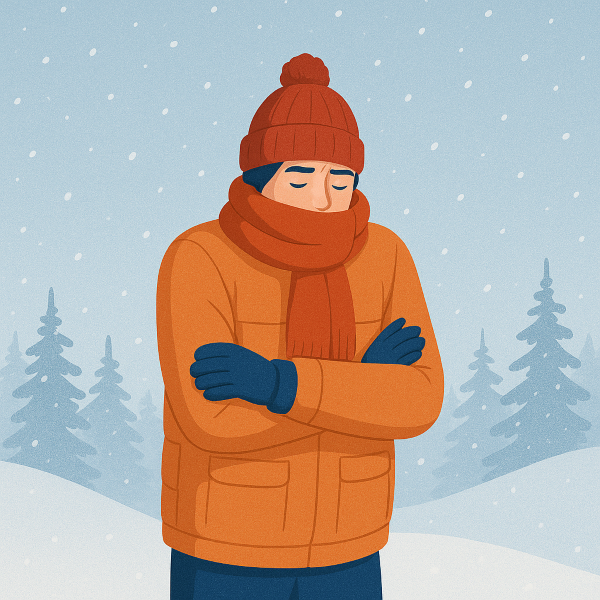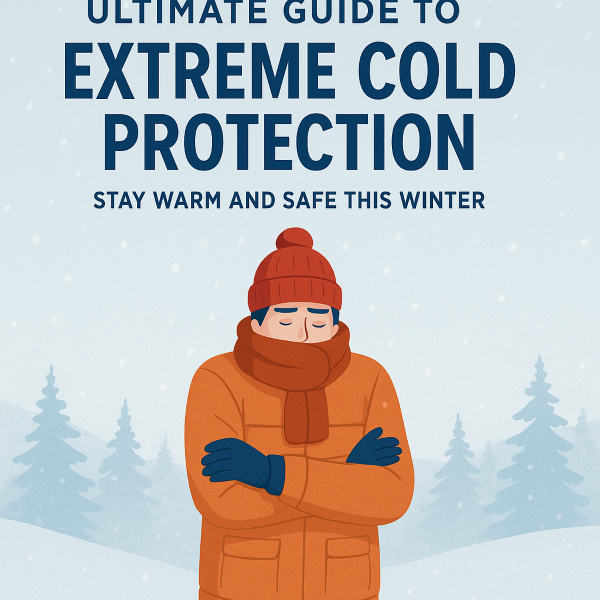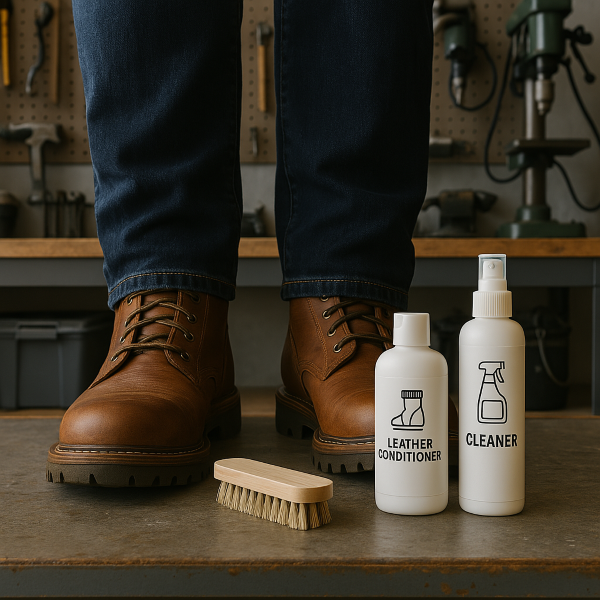Ultimate Guide to Extreme Cold Protection: Stay Warm and Safe This Winter

Stay safe this winter with expert cold-weather protection tips, top-rated warming gear, and emergency advice for frostbite and hypothermia prevention.
When temperatures plummet, your health and safety can be at serious risk. Whether you’re working outdoors, exploring snowy trails, or simply living in a frigid climate, understanding how to protect yourself from the cold is essential. This guide will show you how to layer properly, spot warning signs early, and choose the best gear to stay warm and safe all winter long.
🧠 What Happens When You Get Too Cold – And How to Respond
Cold-related illnesses like frostbite and hypothermia occur when your body can no longer maintain its core temperature. Prolonged exposure to freezing temperatures causes blood vessels to constrict, reducing blood flow to extremities and putting vital organs at risk.
❄️ Frostbite and Hypothermia: Know the Warning Signs
Frostbite Symptoms
- Numbness or tingling in fingers, toes, ears, or nose
- Pale, gray, or waxy skin
- Skin feels hard or frozen
- Blisters after rewarming
Hypothermia Symptoms
- Shivering or trembling
- Slurred speech or confusion
- Clumsiness or loss of coordination
- Drowsiness or fatigue
- Slow pulse and shallow breathing
⚠️ Important: Both frostbite and hypothermia can develop faster than you think—especially with wind or wet clothing.
🚨 What to Do in a Cold Emergency
If you suspect hypothermia:
- Move the person indoors or to a sheltered area.
- Remove any wet clothing and replace it with dry, insulated layers.
- Wrap the person in blankets, focusing on the neck and torso.
- Offer warm (not hot) drinks if they are fully alert.
- Call emergency services immediately.
If frostbite occurs:
- Move to a warm area.
- Do not rub or massage the skin.
- Warm the area gradually using body heat or lukewarm water (100–104°F).
- Cover with a clean, dry cloth.
- Seek medical care as soon as possible.
💡 Key Difference: Frostbite vs. Hypothermia
| Condition | Core Body Temp | Symptoms | Skin | Immediate Action |
|---|---|---|---|---|
| Frostbite | Normal or slightly low | Numbness, pale or gray skin, blisters | Hard, waxy | Warm gently, seek care |
| Hypothermia | Below 95°F (35°C) | Confusion, slurred speech, fatigue | Cool, pale | Warm body, call 911 |
🧤 Prevention Is the Best Protection
Staying warm starts with preparation and the right layers. Here’s how to do it:
Layering Strategy
- Base Layer (Moisture Control):
- Merino wool or synthetic thermal top and leggings.
- Avoid cotton—it holds moisture.
- Middle Layer (Insulation):
- Fleece, down, or wool sweater.
- Traps body heat effectively.
- Outer Layer (Weather Barrier):
- Windproof, waterproof jacket or parka.
- Look for breathable materials with sealed seams.
Other Cold-Weather Tips
- Keep your head, hands, and feet covered—most body heat escapes there.
- Stay dry. Wet clothes increase heat loss by 25x.
- Eat regularly to fuel your body’s heat production.
- Avoid alcohol—it lowers your core temperature.
🔋 Top Products for Extreme Cold Protection
| Product | Type | Key Features | Price Range | Best For |
|---|---|---|---|---|
| HotHands Hand Warmers | Heating Accessory | Air-activated heat lasts up to 10 hours | $10–$20 | Outdoor work, sports, travel |
| Carhartt Yukon Extremes Jacket | Insulated Outerwear | Water-repellent 500D Cordura shell, heavy insulation | $100–$209 | Construction, cold climates |
| Thermacell Heated Insoles | Heated Footwear | Rechargeable, remote-controlled warmth | $33–$200 | Hiking, long outdoor shifts |
| Mr. Heater Buddy Portable Heater | Personal Heater | Indoor-safe propane heat source | $90–$120 | Emergencies, RVs, cabins |
| Arctix Insulated Bib Overalls | Full-Body Gear | Wind-resistant, thermal insulation | $50–$190 | Snow work, winter sports |
🔍 In-Depth Product Breakdown
HotHands Hand Warmers
- Simple and disposable; just open and shake.
- Lasts up to 10 hours.
- Great for pockets, gloves, or boots.
Carhartt Yukon Extremes Jacket
- Built for harsh weather with water-repellent outer shell.
- Insulated interior keeps you warm below freezing.
- Durable enough for heavy labor or outdoor work.
Thermacell Heated Insoles
- Adjustable temperature via remote.
- Rechargeable lithium battery lasts up to 5 hours.
- Keeps feet warm without bulky socks.
Mr. Heater Buddy Portable Heater
- Safe for indoor use with low-oxygen shutoff.
- Heats up to 225 square feet.
- Perfect for power outages or garage projects.
Arctix Insulated Bib Overalls
- 85g of ThermaTech insulation for sub-zero temps.
- Adjustable suspenders and boot gaiters for comfort.
- Designed for mobility and warmth during outdoor work.
🏠 Home and Vehicle Preparation
Home Checklist:
- Seal windows and doors to prevent drafts.
- Insulate pipes to avoid freezing.
- Keep extra blankets and non-perishable food.
- Test smoke and carbon monoxide detectors.
Vehicle Checklist:
- Keep at least half a tank of gas.
- Store blankets, food, and water.
- Include jumper cables and a flashlight.
- Check tire pressure and antifreeze levels.
🧯 Emergency Kit Essentials
✅ Heavy blanket or sleeping bag per person
✅ Hand and foot warmers
✅ First-aid kit and necessary medications
✅ Non-perishable snacks and bottled water
✅ Battery-powered flashlight
✅ Portable phone charger or power bank
🧭 Quick Safety Recap
- Dress in layers and stay dry.
- Know early warning signs of frostbite and hypothermia.
- Warm gradually—never with direct high heat.
- Prepare your home and car for cold-weather emergencies.
🏁 Conclusion
Surviving the cold isn’t just about comfort—it’s about safety. With the right clothing, gear, and awareness, you can handle even the harshest winter conditions confidently.
Whether you’re working outdoors, shoveling snow, or heading out on a winter adventure, preparation is key. Stay warm, stay alert, and stay safe.
Ready to upgrade your cold-weather protection? Start with one of our top picks above and take control of your winter safety today.









